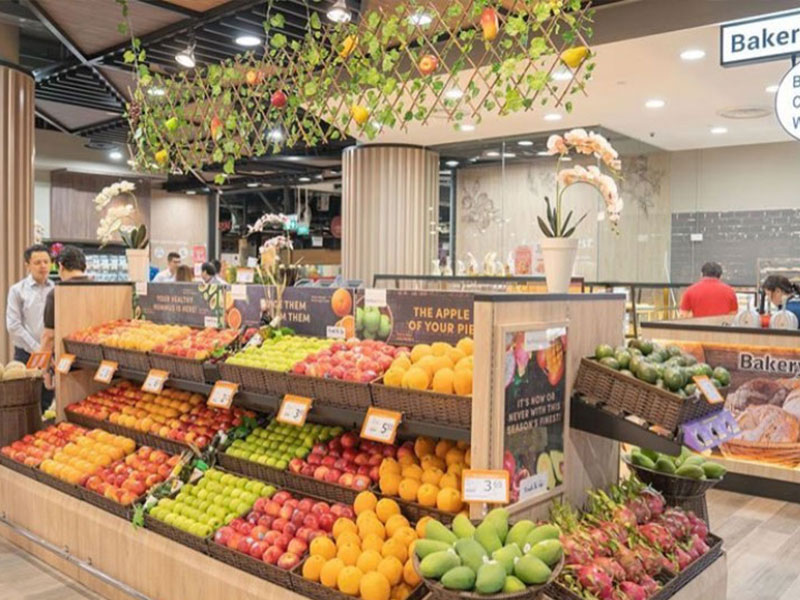Sri Lanka’s Trade, Commerce, and Food Security Minister met Singapore’s Non-Resident High Commissioner to discuss increasing trade and investment relations between the two countries.
High Commissioner Chandra Das invited Minister Nalin Fernando “to visit the NTUC supermarket chain in Singapore as it would provide insight into running Sri Lanka’s supermarket chains, including Lanka Sathosa,” a statement by the Department of Government Information said.
NTUC FairPrice is the largest supermarket chain in Singapore, with more than 60% market share.
Fernando pointed out that post-harvest damage was very high in Sri Lanka and asked for Singapore’s help with technical knowledge to store sufficient stocks for long periods.
Community Focus: NTUC FairPrice’s cooperative structure aligns with Sri Lanka’s existing cooperative movement and focuses on serving the community’s needs, potentially leading to fairer pricing and better product offerings for consumers.
Sustainability: The cooperative model encourages long-term planning and reinvestment in the community, which could benefit Sri Lanka’s sustainable development goals.
Sustainability: The cooperative model encourages long-term planning and reinvestment in the community, which could benefit Sri Lanka’s sustainable development goals.
Operational Efficiency:
Diversification: NTUC FairPrice’s multiple retail formats cater to different needs and income levels, offering a model for Sri Lanka to expand supermarket reach and accessibility.
Branding and Marketing: NTUC FairPrice’s “Singapore’s very own” slogan successfully resonates with national pride. Sri Lanka could explore similar branding strategies to promote local products and brands.
Supply Chain Management: NTUC FairPrice’s partnership with ExxonMobil for Cheers convenience stores demonstrates efficient supply chain integration, which Sri Lanka could adapt to reduce inefficiencies and costs.
Customer Focus:
Branding and Marketing: NTUC FairPrice’s “Singapore’s very own” slogan successfully resonates with national pride. Sri Lanka could explore similar branding strategies to promote local products and brands.
Supply Chain Management: NTUC FairPrice’s partnership with ExxonMobil for Cheers convenience stores demonstrates efficient supply chain integration, which Sri Lanka could adapt to reduce inefficiencies and costs.
Customer Focus:
Loyalty Programs: NTUC FairPrice’s dividends and cash-back rebates for members and shareholders incentivize loyalty and build customer relationships, a strategy Sri Lankan supermarkets could adopt.
Community Engagement: NTUC FairPrice’s focus on community initiatives creates goodwill and brand loyalty. Sri Lankan supermarkets could participate in similar initiatives to connect with local communities.
However, it’s crucial to consider contextual differences:
Community Engagement: NTUC FairPrice’s focus on community initiatives creates goodwill and brand loyalty. Sri Lankan supermarkets could participate in similar initiatives to connect with local communities.
However, it’s crucial to consider contextual differences:
Market Size: Singapore’s smaller, densely populated market differs from Sri Lanka’s larger, geographically dispersed one. Tailoring retail formats and distribution networks is necessary.
Income Levels: Singapore’s higher average income may not directly translate to Sri Lanka’s economic realities. Affordability and value for money should be prioritized.
Overall, studying NTUC FairPrice’s success can provide valuable insights and inspiration for Sri Lanka’s supermarket sector to improve efficiency, expand reach, and better serve its communities. Adapting these learnings to the specific context of Sri Lanka’s market and needs will be key to successful implementation.
Income Levels: Singapore’s higher average income may not directly translate to Sri Lanka’s economic realities. Affordability and value for money should be prioritized.
Overall, studying NTUC FairPrice’s success can provide valuable insights and inspiration for Sri Lanka’s supermarket sector to improve efficiency, expand reach, and better serve its communities. Adapting these learnings to the specific context of Sri Lanka’s market and needs will be key to successful implementation.








